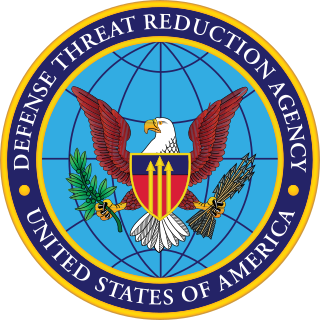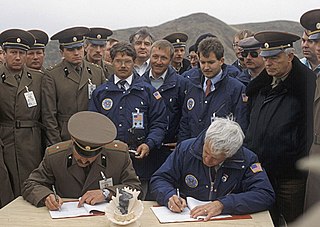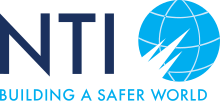
Nuclear terrorism refers to any person or persons detonating a nuclear weapon as an act of terrorism. Some definitions of nuclear terrorism include the sabotage of a nuclear facility and/or the detonation of a radiological device, colloquially termed a dirty bomb, but consensus is lacking. In legal terms, nuclear terrorism is an offense committed if a person unlawfully and intentionally "uses in any way radioactive material … with the intent to cause death or serious bodily injury; or with the intent to cause substantial damage to property or to the environment; or with the intent to compel a natural or legal person, an international organization or a State to do or refrain from doing an act", according to the 2005 United Nations International Convention for the Suppression of Acts of Nuclear Terrorism.

Samuel Augustus Nunn Jr. is an American politician who served as a United States Senator from Georgia (1972–1997) as a member of the Democratic Party.

As the collapse of the Soviet Union appeared imminent, the United States and their NATO allies grew concerned of the risk of nuclear weapons held in the Soviet republics falling into enemy hands. The Cooperative Threat Reduction (CTR) program was initiated by the Nunn–Lugar Act, which was authored and cosponsored by Sens. Sam Nunn (D-GA) and Richard Lugar (R-IN). The purpose of the CTR Program was originally "to secure and dismantle weapons of mass destruction and their associated infrastructure in former Soviet Union states." As the peace dividend grew old, an alternative 2009 explanation of the program was "to secure and dismantle weapons of mass destruction in states of the former Soviet Union and beyond". The CTR program funds have been disbursed since 1997 by the Defense Threat Reduction Agency (DTRA).

The Defense Threat Reduction Agency (DTRA) is both a defense agency and a combat support agency within the United States Department of Defense (DoD) for countering weapons of mass destruction and supporting the nuclear enterprise. Its stated mission is to provide "cross-cutting solutions to enable the Department of Defense, the United States Government, and international partners to Deter strategic attack against the United States and its allies; Prevent, reduce, and counter WMD and emerging threats; and Prevail against WMD-armed adversaries in crisis and conflict." DTRA is headquartered in Fort Belvoir, Virginia. The DTRA mission, organization and management, responsibilities and functions, relationships, authorities, and administration are defined in DoD Directive 5105.62, Defense Threat Reduction Agency (DTRA) .
A nuclear fuel bank is reserve of low enriched uranium (LEU) for countries that need a backup source of LEU to fuel their nuclear reactors. Countries that do have enrichment technology would donate enriched fuel to a "bank", from which countries not possessing enrichment technology would obtain fuel for their power reactors.
Material Protection, Control and Accounting (MPC&A) refers to the safeguarding of nuclear assets, including nuclear fuel and weapons. In the United States, the National Nuclear Security Administration (NNSA), a component of the Department of Energy, oversees MPC&A as part of its nonproliferation program.

Iran's nuclear program is made up of a number of nuclear facilities, including nuclear reactors and various nuclear fuel cycle facilities.
President Adly Mansour announced on 7 November 2013 that Egypt was restarting its nuclear power program in El Dabaa; a deal was reached with the residents in which it was agreed that a residential area will also be built. The Egyptian minister of electricity, Ahmed Emam, has called the project "necessary" because of a small amount of renewable energy sources and not enough fuel.

Margaret Ann "Peggy" Hamburg is an American physician and public health administrator, who is serving as the chair of the board of the American Association for the Advancement of Science (AAAS) and co-chair of the InterAcademy Partnership (IAP). She served as the 21st Commissioner of the U.S. Food and Drug Administration from May 2009 to April 2015.

Charles B. Curtis is an American lawyer, currently senior advisor (nonresident) to the Center for Strategic and International Studies, vice chair of the United States Department of State's International Security Advisory Board, 2011 through 2017, former member of the National Academies Intelligence Science and Technology Experts Group, and President Emeritus of the Nuclear Threat Initiative (NTI), a non-profit organization working to reduce the threats from nuclear, biological and chemical weapons. In addition to working in private practice for more than sixteen years, Curtis served as the last chairman of the Federal Power Commission and the first chairman of the Federal Energy Regulatory Commission from 1977 to 1981. In 1994 he was appointed and confirmed as undersecretary and then deputy secretary of the US Department of Energy. He has held positions on the staff of the U.S. House of Representatives, the U.S. Treasury Department, and the Securities and Exchange Commission.
Project Sapphire was a successful 1994 covert operation of the United States government in cooperation with the Kazakhstan government to reduce the threat of nuclear proliferation by removing nuclear material from Kazakhstan as part of the Cooperative Threat Reduction Program, which was authorized by the Soviet Nuclear Threat Reduction Act of 1991.
The Ivan Allen Jr. Prize for Social Courage is an international award established in 2010 by the Georgia Institute of Technology in recognition of the late Ivan Allen Jr. A Georgia Tech alumnus, Allen became a pivotal leader during America's struggle for racial integration during the 1960s. While mayor of Atlanta, Georgia, USA (1962–1970), Allen risked his place in society, his political future, and his life when he testified before the U.S. Senate Commerce Committee in support of what became the Civil Rights Act of 1964.

The Mekong Basin Disease Surveillance (MBDS) consortium is a self-organised and sub-regional co-operation spearheaded by health ministries from member countries to collaborate on infectious disease surveillance and control. The co-operation focuses on cross-border co-operation at selected sites and has matured through several phases of work. PRO/MBDS is a component of the outbreak reporting system ProMED-mail.

Ernest Jeffrey Moniz, GCIH is an American nuclear physicist and former government official. From May 2013 to January 2017, he served as the 13th United States secretary of energy in the Obama administration. Prior to this, Moniz served as associate director for science in the Office of Science and Technology Policy in the Executive Office of the President of the United States from 1995 to 1997 and undersecretary of energy from 1997 to 2001 during the Clinton administration. He is currently the co-chair and CEO of the Nuclear Threat Initiative (NTI), as well as president and CEO of the Energy Futures Initiative (EFI), a nonprofit organization working on climate and energy technology issues, which he co-founded in 2017.

European Leadership Network (ELN) is a pan-European think-tank focusing on European foreign, defence and security issues based in London, United Kingdom. The ELN's Director is Sir Adam Thomson, former UK Permanent Representative to NATO.

Health security is a concept that encompasses activities and measures across sovereign boundaries that mitigates public health incidents to ensure the health of populations. It is an evolving paradigm within the fields of international relations and security studies. Proponents of health security posit that all states have a responsibility to protect the health and wellbeing of their populations. Opponents suggest health security impacts civil liberties and the equal distribution of resources.

Laura Susan Hayes Holgate is an American diplomat who has served as the United States ambassador to the United Nations International Organizations in Vienna and to the International Atomic Energy Agency since 2022 and previously from 2016 to 2017.

John N. Nkengasong is a Cameroonian-American virologist serving as the Global AIDS Coordinator in the Biden administration since 2022 and Senior Bureau Official for Global Health Security and Diplomacy since 2023. He previously worked as the Director of the Africa Centres for Disease Control and Prevention from 2016 to 2022, as well as at the World Health Organization (WHO) and Centers for Disease Control and Prevention. During the COVID-19 pandemic, Nkengasong was appointed the WHO Special Envoy for Africa.
The Connecting Organizations for Regional Disease Surveillance (CORDS) is a "regional infectious disease surveillance network that neighboring countries worldwide are organizing to control cross-border outbreaks at their source." In 2012, CORDS was registered as a legal, non-profit international organization in Lyon, France. As of 2021, CORDS was composed of "six regional member networks, working in 28 countries in Africa, Asia, the Middle East and Europe."

The Republic of Kazakhstan, once a republic of the Soviet Union, was a primary venue for Soviet nuclear weapon testing from 1949 until 1989. Following the collapse of the Union of Soviet Socialist Republics (USSR) in 1991, Kazakhstan became the fourth-largest nuclear power in the world and hosted a considerably large weapon support infrastructure due to its reliance on the Soviet nuclear program as a means to develop its own local economy. Besides the nuclear program, Kazakhstan was also a prominent site of Soviet programs of biological and chemical weapons.













